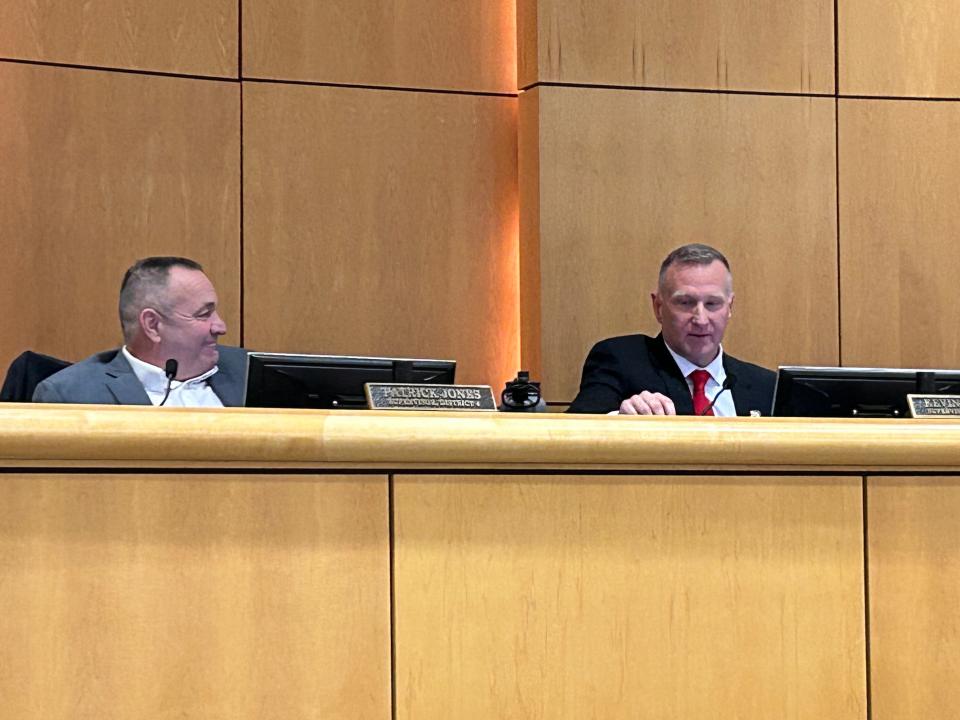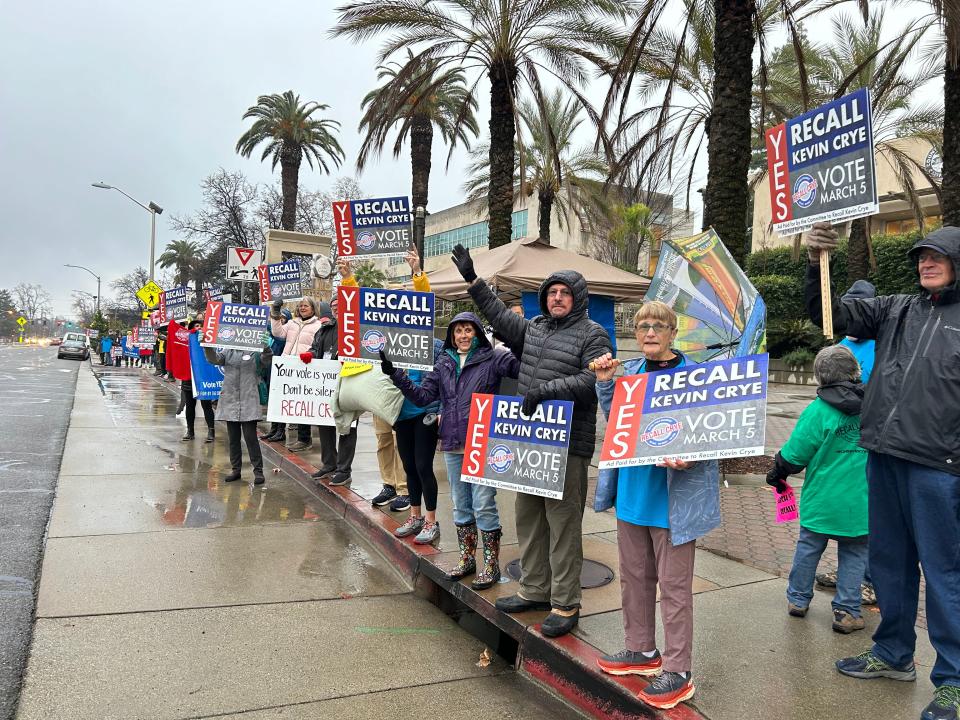Can ending 'impact fees' for builders spur growth in Shasta County? Board majority says yes.
Shasta County took what is believed to be an unprecedented move Tuesday when a divided Board of Supervisors voted to eliminate development impact fees for new development in the unincorporated areas of the county.
District 1 Supervisor Kevin Crye, who put the item on the agenda, along with Supervisors Chris Kelstrom and Patrick Jones voted to suspend the fees. They said doing so will spur growth in the county and raise property values. They also said any money lost from impact fee revenue will be made up in sales and property tax revenue generated by the growth.
“The county is not an easy place to do business or start a business and directly tied to that is the heavy burden of impact fees charged by Shasta County,” Crye said Tuesday during his first meeting as board chairman.
Counties and cities charge impact fees to builders and developers to help pay for the growth. Among other things, fees are charged for law enforcement and fire protection services, parks, traffic needs and general government.
Some residents who spoke before the vote asked Jones to recuse himself since his plan to open a shooting range on a 151-acre piece of land in a rural area east of Anderson would benefit from a fee suspension, they said.

Jeff Gorder, retired Shasta County public defender, said people deserve to know how Jones will benefit from the suspension of impact fees.
“I can’t believe you’re not recusing yourself from this,” he said.
Jones did not comment, only saying after the vote, during open comment period, that he did recuse himself prior to his project’s approval by supervisors in October.
On Wednesday, the Record Searchlight emailed county Resource Management Director Paul Hellman to ask how much Jones' gun range project would have paid in impact fees. Hellman said since no building permits have been applied for, there had been no formal impact fee calculations.
However, Hellman estimated that impact fees for the gun range, based on the plans that were submitted prior to approval, would have been around $20,000 under the current impact fee program, which was suspended by the board majority on Tuesday.
"Traffic impact fees are not applicable since the project site is not within the South County Region" as defined in the current fee impact program, Hellman emailed.
The suspension of impact fees is scheduled to take effect in 30 days.
Supervisors Mary Rickert and Tim Garman voted no. They said the county should gather more information and bring in developers, economists and other experts to talk about how impact fees affect growth, if at all.
Garman asked county auditor Nolda Short if a study was done to compare Shasta County impact fees to those charged in other counties, since during public comment, some speakers alleged that Shasta fees are exorbitantly high. The county did not do such a study, Short said.
Garman also asked if Shasta looked at other counties in California that charge development impact fees to see how their growth has been impacted, adding that maybe impact fees are not the issue.
“This is a very important topic. We need to have all the information,” Garman said.
Shasta might be the first county in California to eliminate impact fees, industry officials said.
“Our initial research found no record of a local government eliminating their impact fees; however, multiple jurisdictions have reduced or deferred their impact fees,” California State Association of Counties spokeswoman Rachael Serrao wrote in an email to the Record Searchlight.
The board's majority gave every indication that the suspension of fees won't be temporary. The ordinance to suspend the fees remains in effect until supervisors lift the suspension.
However, the board's makeup could be much different in 2025.
Jones and Rickert are running for re-election this March. Garman is not running for reelection and Crye faces a recall on the March ballot.
Meanwhile, since it started in 2008, the county’s impact fee program has collected approximately $8.7 million. Just over $3 million from the program has been used for the juvenile rehabilitation facility, south county fire station, the sheriff’s office south county patrol station and the county’s emergency operation center, Short said in her report to supervisors.
Without an impact fee program, the money to pay for growth would come from the general fund, she said.
County resident Judy Salter reminded supervisors that they want to build a new jail.
"We need fire stations. We need to get the jail built," Salter said.
Impact fees were set after the results of a 2008 impact fee study done for Shasta County and the city of Redding estimated the county population would go from 178,000 in 2007 to 246,000 in 2030.
It would appear the county could be hard-pressed to reach that number, since its population in July 2022 had risen only slightly to 180,390, according to U.S. Census estimates.
Crye said the fees are unjustified because the county hasn’t experienced the growth that was estimated when the study was done 15 years ago.
Two longtime Shasta County real estate agents who addressed the supervisors had different opinions about the effect of impact fees.
Realtor Scott Swendiman said developers take a huge financial risk.
“Then you get impact fees on top of that. I’ve represented a number of contractors since impact fees came in and it always came down to, ‘Holy cow, can we cash-flow this thing in light of the impact fees?' Because the impact fees are a lot of money,” Swendiman said.
More: How full are Lake Shasta, Trinity Lake and other reservoirs going into 2024?
Resource Management Director Hellman said impact fees for a single-family home in the unincorporated county depend on where the home is built and vary between $6,000 and $10,000.
Realtor Brad Garbutt said reducing impact fees will not make housing more affordable, as some have suggested, because the market dictates housing prices.
“Let’s cut the fees and hope that they pass it on to the consumer. Well, as far as homebuilders go, they will sell the home for whatever the market will bear. They are not going to pass the savings of the impact fees onto the home buyer,” Garbutt said.

Recall supporters rally before supervisors meeting
About 70 people stood outside in the rain before Tuesday’s Board of Supervisors meeting to support the recall of District 1 Supervisor Crye.
The recall is on the March 5 ballot. Crye is the second board chair in two years facing a recall.
Former District 2 Supervisor Leonard Moty was elected chair in January 2022. He was recalled less than a month later in a special election.
“The recall is going extremely well,” Committee to Recall Kevin Crye spokesman Jeff Gorder said. “We had our first weekend canvassing in neighborhoods, this last Saturday and Sunday, had about 50 people out in the neighborhoods. The response was outstanding, a lot of enthusiasm amongst our supporters."
“This is kind of a campaign kickoff for coming up March 5 election. We’re just letting everybody know that we got the recall on the ballot and that we’re encouraging everybody to vote yes,” he added. “It’s also corresponding to Supervisor Crye’s first day as chairman of the board of supervisors. We want to let him know that there’s a lot of us who are extremely dissatisfied with his agenda.”
David Benda covers business, development and anything else that comes up for the USA TODAY Network in Redding. He also writes the weekly "Buzz on the Street" column. He’s part of a team of dedicated reporters that investigate wrongdoing, cover breaking news and tell other stories about your community. Reach him on X, formerly Twitter, @DavidBenda_RS or by phone at 1-530-338-8323. To support and sustain this work, please subscribe today.
This article originally appeared on Redding Record Searchlight: Divided Shasta Board of Supervisors votes to end builders' impact fees

